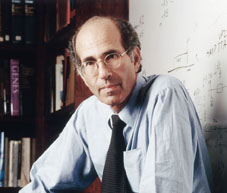|
|
|
AROUND THE QUADS
Axel Wins Nobel Prize
By Laura Butchy
Dr. Richard Axel ’67, University Professor
of Biochemistry and Molecular Biophysics and Pathology, won the
2004 Nobel Prize in Physiology or Medicine along with Linda
B. Buck of the Fred Hutchinson Cancer Research Center for
their work explaining how the olfactory system works. Buck was a
postdoctoral fellow at Columbia when they published their initial
paper on the subject in 1991.
Their work has clarified how the nose is able to distinguish more
than 10,000 smells, mapping the genes that govern the sense of smell
and determining how the brain processes smells into perception and
memory. Their research also uncovered more than 1,000 different
genes that encode olfactory receptors in the nose, which is believed
to be the largest gene family in the human genome.
“I’m deeply honored and very pleased,” Axel said.
“This honor represents the efforts of many faculty, students
and fellows who have worked in our laboratories at Columbia University
Medical Center. I have received enormous support through the years,
beginning with the scholarship I received to attend Columbia College.”
The sense of smell is possible because receptors in the nose pick
up odors from the environment and send that information directly
to the olfactory bulb, the first relay station in the brain. Axel
and Buck determined how neurons converge in the olfactory bulb,
which offered insight into how the brain processes smells. Each
olfactory receptor cell possesses only one type of odorant receptor,
and each receptor can detect a limited number of odorant substances,
so the olfactory receptor cells are highly specialized for a few
odors. Most odors are composed of multiple odorant molecules, and
each odorant molecule activates several odorant receptors, leading
to a combined odorant pattern, which allows us to recognize and
form memories of approximately 10,000 different odors.
“Drs. Axel and Buck embody the spirit of creativity that gives
the university such immeasurable value and relevance to our world,”
President Lee C. Bollinger said. “Their achievement adds to
Columbia’s proud 250-year heritage and stands out among the
many contributions Columbians continue to make through their dedicated
research in science and medicine and so many other endeavors.”
Axel and Buck join the list of 70 other people who have taught,
conducted research or studied at Columbia and have received the
Nobel Prize since it was first awarded in 1901, including 19 in
the category of physiology or medicine.
Gerald D. Fischbach, executive v.p. of the Medical Center, said,
“Dr. Axel’s work is among the most important discoveries
of the past 50 years, providing insights regarding how individuals
perceive their external environment. He has been an enormously important
influence for all the sciences here at Columbia.”
Axel has spent his entire professional career at Columbia. In addition
to being University Professor, Axel is an investigator for the Howard
Hughes Medical Institute at P&S, an investigator for Columbia’s
Kavli Institute for Brain Science and a member of the Center for
Neurobiology and Behavior at the Medical Center.
There are no set guidelines for deciding who wins the Nobel Prize.
Alfred Nobel, the inventor of dynamite who endowed the awards, simply
said the winner “shall have made the most important discovery
within the domain of physiology or medicine.” The Nobel Assembly
at Stockholm’s Karolinska Institutet selects the medicine
prizewinner after inviting nominations from previous recipients,
professors of medicine and other professionals worldwide. The awards
will be presented on December 10, the anniversary of Nobel’s
1896 death.
|
|
Untitled Document
|




